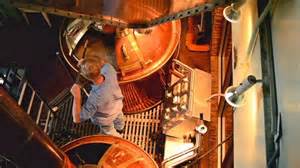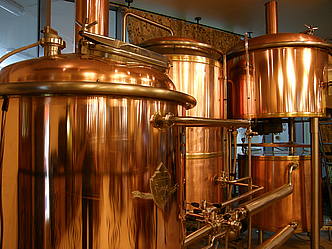Bakken Brew Haus
What does a Brewmeister Do?
A brewmaster makes beer. This may sound like a dream job to some, but the process of making beer is a highly-skilled art that can be cumbersome, tedious, time-consuming, and even dangerous. Brewmasters work in various-sized beer factories throughout the world and typically oversee the beer-making process from start to finish.
The amount of work required of a brewmaster mainly hinges on the work environment and amount of beer production required. In a large production facility, such as a commercial brewery, the position may involve more of a managerial role that involves overseeing those who do most of the hands-on work. At microbreweries, where the beer is produced in much smaller quantities, a brewmaster will usually have a much greater hands-on role throughout the process of making beer. Home beer brewers and hobbyists are also considered brewmasters.
The primary duty of the brewmaster is to ensure the quality of the beer brewed, which includes making sure batches of the same beer are consistent. There are several steps to the process that must be followed to strict specifications. These begin with gathering the necessary ingredients, some of which must be handpicked by the brewer depending on the uniqueness of the beer. Unique ingredient possibilities are practically endless, but include malted grains, hops, yeast, woods, and fruits.What follows is a complicated process of mixing, boiling, cooling, storing and bottling all of the ingredients of the beer. A more involved brewmaster is present during most, if not all, of these steps. He or she must ensure that exact specifications are met regarding temperatures of mixtures and the various times they must be treated and left to rest.
In a worst-case scenario, failure to follow proper protocol can lead to beer that is not good for consumption; this product must be disposed of, and the whole process must be started over from scratch. The most important consideration for a brewmaster is the cleanliness of the brewing equipment. Contamination, especially when the beer is cooled, will disrupt proper fermentation, rendering the batch useless. Improperly or impatiently brewed concoctions can also cause dangerous conditions, even leading to exploding beer bottles and other hazardous conditions.
After brewing a batch of beer, a brewmaster must taste it—what many consider the best part of the job. This is where their expertise really comes into play; they must be able to taste the smallest variation between batches, and ensure a unique brew has the flavors, colors, and other qualities that he or she had in mind. Beer tasting also may consist of garnering outside opinions of a product by allowing customers to test it.
Many brewmasters also network with other beer professionals for new ideas and business advice. Others are trainers and teachers in charge of showing beginners how to brew beer in both casual and professional atmospheres. Requirements to become a brewmaster vary by brewery, but generally involve years of experience. Some schools offer certifications that may help an aspiring brewer gain employment under an experienced brewmaster where he or she can start gaining the necessary experience to work independently.
What is Micro Brewing?
Even though it sounds like a miniature beer, a microbrew is actually a beer brewed in a small commercial brewery. In the U.S., it is a beer produced at a microbrewery that brews no more than 15,000 barrels of beer per year. Brewed and distributed on a regional basis, some of these beverages are also known as craft beers.
The emphasis of a craft beer is the quality of the product rather than its mass production. These beers are also known as real ale or cask ale. Similarly, a microbrew pub is one that sells beer that is produced in limited quantities on the premises. Some pubs allow sampling, or tasting, of their products.
Although the term microbrewery originated in the United Kingdom in the 1970s, many of the beers they made became so successful that they outgrew their statistical category. Because these small breweries pay particular attention to ingredients and monitor the entire brewing process, the term craft beer is descriptive. Using the traditional brewing process, the beer starts with the sugars from a form of malted grain, either barley or wheat, added to hop flowers and water. The mixture is aged and generally not pasteurized. The difference in the process occurs after the initial fermentation.
Instead of filtering and heating, the process used for mass market bottled beer, cask ale is placed directly into a cask where it continues to develop. Some craft beers are filtered, however. The beer is often carbonated by live yeast that ferments in the container. Darker beers age longer, and light ales must be used more quickly.
Due to the inclusion of specialty malt and hop ingredients, a microbrew varies in aroma and flavor from commercially brewed beer. Aficionados believe that these beers have a more complex flavor than typical American light lagers. The hop flower can cause the beer to have a flowery, fruity, or sweet-smelling aroma. Craft beers are often sold in individual bottles and created for those who appreciate the aromas and flavors that the special attention produces. They might contain natural ingredients as varied as coriander and lavender, and most likely do not contain artificial flavorings, fillers, or thickeners.
Bakken Micro Brewery Hand Crafted Beer's & Ale's





